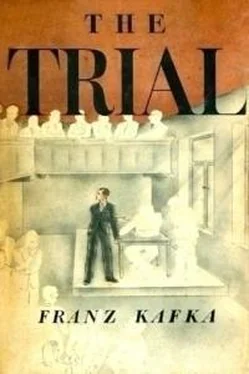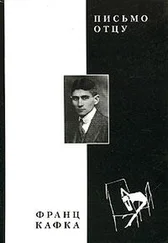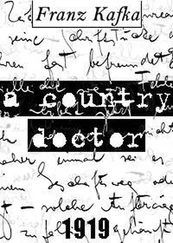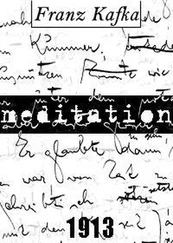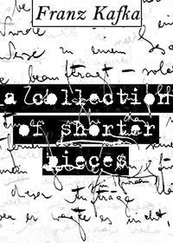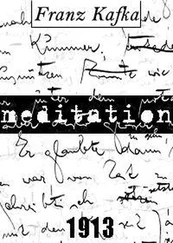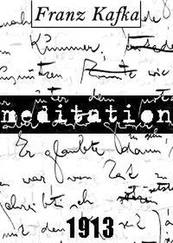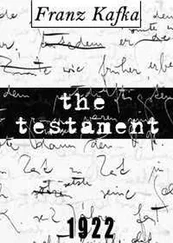At the other end of the hall where K. had been led there was a little table set at an angle on a very low podium which was as overcrowded as everywhere else, and behind the table, near the edge of the podium, sat a small, fat, wheezing man who was talking with someone behind him. This second man was standing with his legs crossed and his elbows on the backrest of the chair, provoking much laughter. From time to time he threw his arm in the air as if doing a caricature of someone. The youth who was leading K. had some difficulty in reporting to the man. He had already tried twice to tell him something, standing on tip– toe, but without getting the man's attention as he sat there above him. It was only when one of the people up on the podium drew his attention to the youth that the man turned to him and leant down to hear what it was he quietly said. Then he pulled out his watch and quickly looked over at K. "You should have been here one hour and five minutes ago," he said. K. was going to give him a reply but had no time to do so, as hardly had the man spoken than a general muttering arose all over the right hand side of the hall. "You should have been here one hour and five minutes ago," the man now repeated, raising his voice this time, and quickly looked round the hall beneath him. The muttering also became immediately louder and, as the man said nothing more, died away only gradually. Now the hall was much quieter than when K. had entered. Only the people up in the gallery had not stopped passing remarks. As far as could be distinguished, up in the half–darkness, dust and haze, they seemed to be less well dressed than those below. Many of them had brought pillows that they had put between their heads and the ceiling so that they would not hurt themselves pressed against it.
K. had decided he would do more watching than talking, so he did not defend himself for supposedly having come late, and simply said, "Well maybe I have arrived late, I'm here now." There followed loud applause, once more from the right hand side of the hall. Easy people to get on your side, thought K., and was bothered only by the quiet from the left hand side which was directly behind him and from which there was applause from only a few individuals. He wondered what he could say to get all of them to support him together or, if that were not possible, to at least get the support of the others for a while.
"Yes," said the man, "but I'm now no longer under any obligation to hear your case" – there was once more a muttering, but this time it was misleading as the man waved the people's objections aside with his hand and continued – "I will, however, as an exception, continue with it today. But you should never arrive late like this again. And now, step forward!" Someone jumped down from the podium so that there would be a place free for K., and K. stepped up onto it. He stood pressed closely against the table, the press of the crowd behind him was so great that he had to press back against it if he did not want to push the judge's desk down off the podium and perhaps the judge along with it.
The judge, however, paid no attention to that but sat very comfortably on his chair and, after saying a few words to close his discussion with the man behind him, reached for a little note book, the only item on his desk. It was like an old school exercise book and had become quite misshapen from much thumbing. "Now then," said the judge, thumbing through the book. He turned to K. with the tone of someone who knows his facts and said, "you are a house painter?" "No," said K., "I am the chief clerk in a large bank." This reply was followed by laughter among the right hand faction down in the hall, it was so hearty that K. couldn't stop himself joining in with it. The people supported themselves with their hands on their knees and shook as if suffering a serious attack of coughing. Even some of those in the gallery were laughing. The judge had become quite cross but seemed to have no power over those below him in the hall, he tried to reduce what harm had been done in the gallery and jumped up threatening them, his eyebrows, until then hardly remarkable, pushed themselves up and became big, black and bushy over his eyes.
The left hand side of the hall was still quiet, though, the people stood there in rows with their faces looking towards the podium listening to what was being said there, they observed the noise from the other side of the hall with the same quietness and even allowed some individuals from their own ranks, here and there, to go forward into the other faction. The people in the left faction were not only fewer in number than the right but probably were no more important than them, although their behaviour was calmer and that made it seem like they were. When K. now began to speak he was convinced he was doing it in the same way as them.
"Your question, My Lord, as to whether I am a house painter – in fact even more than that, you did not ask at all but merely imposed it on me – is symptomatic of the whole way these proceedings against me are being carried out. Perhaps you will object that there are no proceedings against me. You will be quite right, as there are proceedings only if I acknowledge that there are. But, for the moment, I do acknowledge it, out of pity for yourselves to a large extent. It's impossible not to observe all this business without feeling pity. I don't say things are being done without due care but I would like to make it clear that it is I who make the acknowledgement."
K. stopped speaking and looked down into the hall. He had spoken sharply, more sharply than he had intended, but he had been quite right. It should have been rewarded with some applause here and there but everything was quiet, they were all clearly waiting for what would follow, perhaps the quietness was laying the ground for an outbreak of activity that would bring this whole affair to an end. It was somewhat disturbing that just then the door at the end of the hall opened, the young washerwoman, who seemed to have finished her work, came in and, despite all her caution, attracted the attention of some of the people there. It was only the judge who gave K. any direct pleasure, as he seemed to have been immediately struck by K.'s words. Until then, he had listened to him standing, as K.'s speech had taken him by surprise while he was directing his attention to the gallery. Now, in the pause, he sat down very slowly, as if he did not want anyone to notice. He took out the notebook again, probably so that he could give the impression of being calmer.
"That won't help you, sir," continued K., "even your little book will only confirm what I say." K. was satisfied to hear nothing but his own quiet words in this room full of strangers, and he even dared casually to pick up the examining judge's notebook and, touching it only with the tips of his fingers as if it were something revolting, lifted it in the air, holding it just by one of the middle pages so that the others on each side of it, closely written, blotted and yellowing, flapped down. "Those are the official notes of the examining judge," he said, and let the notebook fall down onto the desk. "You can read in your book as much as you like, sir, I really don't have anything in this charge book to be afraid of, even though I don't have access to it as I wouldn't want it in my hand, I can only touch it with two fingers." The judge grabbed the notebook from where it had fallen on the desk – which could only have been a sign of his deep humiliation, or at least that is how it must have been perceived – tried to tidy it up a little, and held it once more in front of himself in order to read from it.
The people in the front row looked up at him, showing such tension on their faces that he looked back down at them for some time. Every one of them was an old man, some of them with white beards. Could they perhaps be the crucial group who could turn the whole assembly one way or the other? They had sunk into a state of motionlessness while K. gave his oration, and it had not been possible to raise them from this passivity even when the judge was being humiliated. "What has happened to me," continued K., with less of the vigour he had had earlier, he continually scanned the faces in the first row, and this gave his address a somewhat nervous and distracted character, "what has happened to me is not just an isolated case. If it were it would not be of much importance as it's not of much importance to me, but it is a symptom of proceedings which are carried out against many. It's on behalf of them that I stand here now, not for myself alone."
Читать дальше
Конец ознакомительного отрывка
Купить книгу
